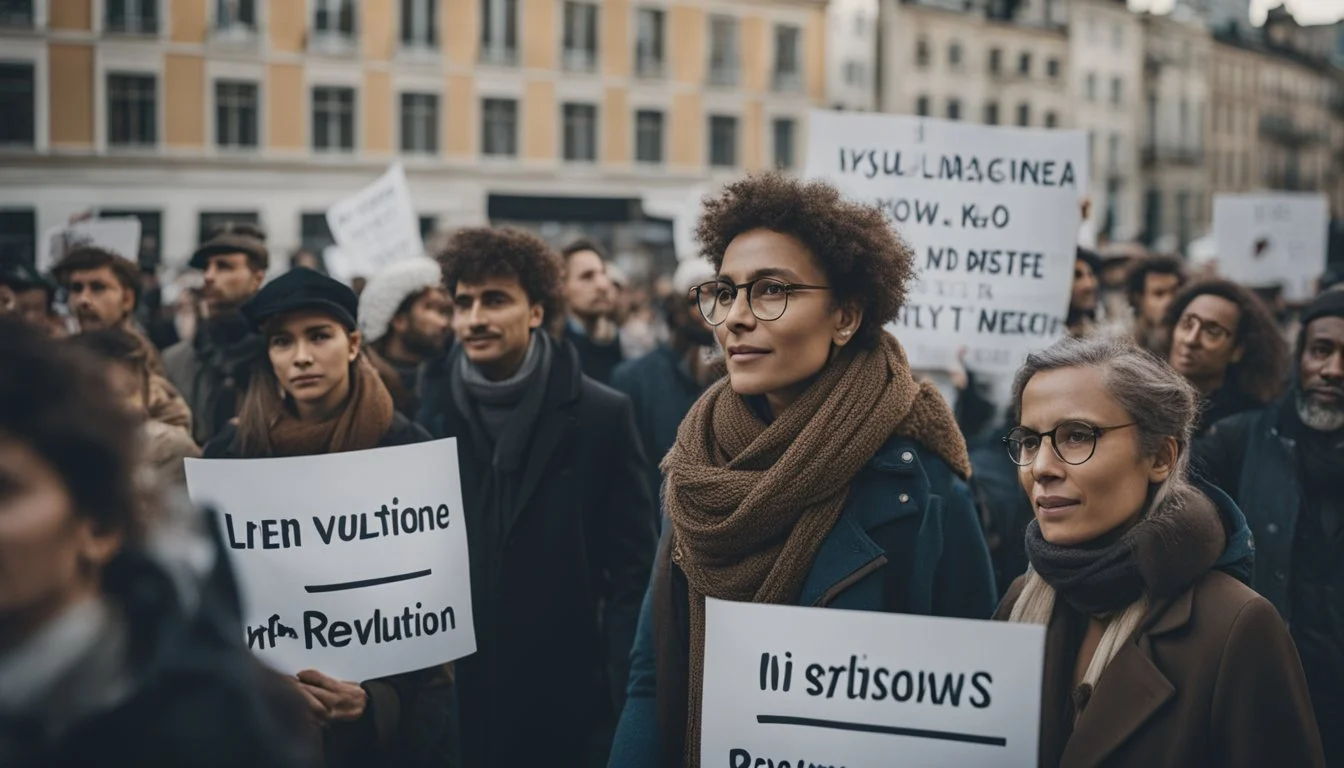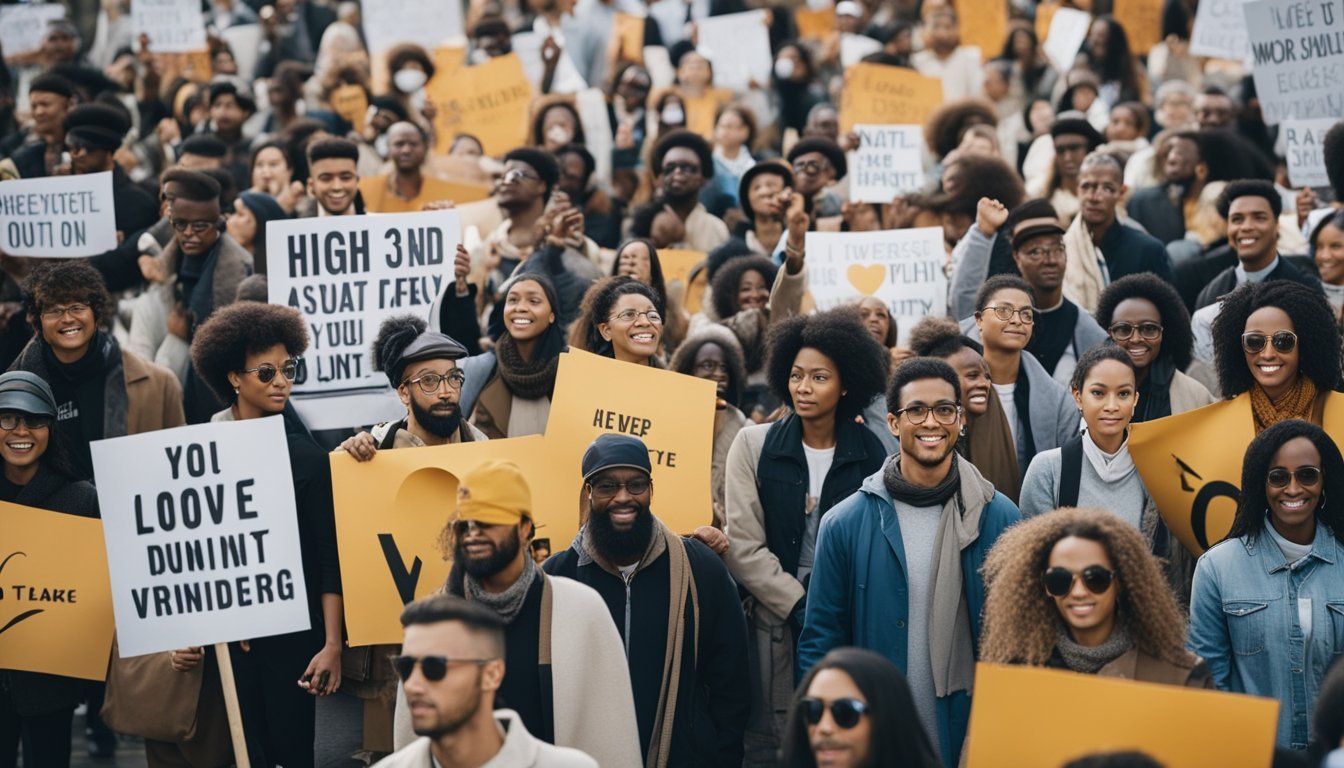4 Documentaries That Investigate the Role of Love in Political Movements
Exploring Passion's Influence on Social Change
Political movements have shaped history, often driven by complex motivations and shared ideals. Documentaries exploring these movements offer viewers intimate insights into the human stories behind sweeping social changes. They reveal not just the political strategies and public actions, but also the personal connections that fuel activism.
Love plays a crucial role in many political movements, binding people together and inspiring them to fight for change. Whether romantic partnerships, familial bonds, or deep friendships, these relationships often provide the emotional foundation for sustained activism. By examining four documentaries that highlight this aspect, we can gain a deeper understanding of how personal connections intertwine with broader political goals.
1) 'The Power of Love: Love and Revolution in Theory and Practice' by Jane Doe (2022)
This documentary explores the connection between love and revolutionary movements. It examines how love can be a driving force for social and political change.
The film features interviews with activists, scholars, and community leaders who discuss their experiences with love as a catalyst for transformation. They share insights on how compassion and empathy fuel their work.
Jane Doe's documentary highlights historical examples of love-driven revolutions, from the Civil Rights Movement to recent environmental campaigns. It analyzes the strategies used to cultivate love within activist circles.
The film also addresses the challenges of maintaining loving relationships while engaged in intense political struggle. It offers practical advice for integrating love into organizing efforts.
'The Power of Love' provides a thought-provoking look at how affection and care can shape the future of social movements. It encourages viewers to consider the role of love in their own activism.
More information on 'The Power of Love: Love and Revolution in Theory and Practice'
2) 'Romantic Anarchy: Love's Influence on Radical Movements' by John Smith (2021)
'Romantic Anarchy: Love's Influence on Radical Movements' explores the intersection of love and political activism. The documentary examines how romantic relationships and partnerships have shaped various radical movements throughout history.
John Smith's film features interviews with activists and scholars who discuss the role of love in driving social change. It highlights examples of couples who joined forces in pursuit of shared political goals.
The documentary delves into the concept of "relationship anarchy," which challenges traditional notions of romantic partnerships. This philosophy emphasizes the capacity to form multiple meaningful connections without hierarchical structures.
Smith's work also addresses the tensions that can arise when personal relationships become intertwined with political causes. It examines how some movements have embraced free love ideals, while others have grappled with more conservative attitudes.
The film presents a nuanced view of love's impact on radical politics, acknowledging both its potential to inspire and its capacity to complicate collective action.
More information on 'Romantic Anarchy: Love's Influence on Radical Movements'
3) 'Passionate Politics: Love at the Heart of Social Change' by Emily Johnson (2019)
Emily Johnson's thought-provoking documentary explores the role of love in driving political and social movements. The film examines how deep emotional connections can fuel activism and create lasting change.
Johnson interviews activists from various causes, revealing how their passion stems from a place of love - for their communities, for justice, and for a better world. These personal stories highlight the human element behind political struggles.
The documentary also delves into historical movements, showing how love has been a powerful force throughout the ages. It draws parallels between past and present, demonstrating the enduring nature of love-driven activism.
'Passionate Politics' challenges viewers to reconsider the place of emotions in politics. It argues that far from being a weakness, love can be a source of strength and resilience for those fighting for change.
Through compelling visuals and interviews, the film makes a strong case for embracing love as a political force. It leaves audiences with a renewed appreciation for the power of human connection in shaping our world.
More information on 'Passionate Politics: Love at the Heart of Social Change'
4) 'Love and Revolution: Exploring Emotional Engagement in Activism' by Richard Lee (2022)
'Love and Revolution' examines the intersection of emotions and political activism. Director Richard Lee interviews activists from various movements to understand how love drives their commitment to social change.
The documentary highlights how strong emotional connections within activist communities fuel sustained engagement. It explores concepts like solidarity, care, and collective empowerment as crucial elements of effective movements.
Lee's film delves into historical examples, including anti-colonial struggles in Africa and civil rights movements in the United States. It demonstrates how shared experiences of oppression can be transformed into powerful bonds between activists.
The documentary also investigates the emotional toll of long-term activism. It addresses burnout, compassion fatigue, and the importance of self-care in maintaining passion for social causes.
Through personal stories and expert analysis, 'Love and Revolution' presents a compelling case for the role of emotions in political engagement. It challenges viewers to consider how love can be a revolutionary force for change.
More information on 'Love and Revolution: Exploring Emotional Engagement in Activism'
The Intersection of Love and Politics
Love and politics have intertwined throughout history, shaping movements and ideologies. Romantic relationships and shared passions have driven political change, while political beliefs have influenced personal connections.
Historical Context of Love in Political Movements
The 1960s civil rights movement in the United States exemplified love's role in politics. Martin Luther King Jr. emphasized "agape" - selfless, unconditional love - as a driving force for social change. This philosophy inspired non-violent protests and fostered unity among activists.
In South Africa, Nelson Mandela's love for his country and people fueled his fight against apartheid. His marriage to Winnie Mandela became a symbol of resistance, though their relationship later faced political strain.
The LGBTQ+ rights movement has long centered on the fight for love and acceptance. The Stonewall riots of 1969 marked a turning point, driven by individuals demanding the right to love freely.
Influence of Love on Political Ideologies
Communist ideologies often promote collective love for the state and fellow citizens. This concept shaped policies in countries like the Soviet Union and Cuba, emphasizing shared resources and community bonds.
Liberal democracies typically value individual freedoms, including the right to love. This has led to policies supporting marriage equality and anti-discrimination laws.
Nationalism often invokes love of country to rally support. Leaders may use romantic imagery of the homeland to inspire patriotism and justify political actions.
Religious political movements frequently interpret love through spiritual lenses. This can result in policies aimed at preserving traditional family structures or promoting charitable works.
Case Studies and Analysis
Documentaries exploring love in political movements often focus on civil rights struggles and revolutionary activities. These films highlight how personal relationships and collective bonds shape social change.
Impact on Civil Rights Movements
The documentary "Selma" examines Martin Luther King Jr.'s leadership during the 1965 Selma to Montgomery march. It portrays the power of love and unity in advancing voting rights for African Americans.
The film showcases how King's philosophy of nonviolent resistance was rooted in agape love - a selfless, unconditional love for humanity. This approach helped galvanize supporters and challenge oppressive systems.
"Freedom Riders" documents the 1961 civil rights activists who challenged segregation in interstate transit. The film reveals how deep bonds formed between riders of different races, strengthening their resolve in the face of violence.
The Role of Romantic Relationships in Revolutionary Activities
"The Weather Underground" explores the radical leftist organization of the 1960s and 70s. It examines how romantic partnerships within the group influenced their political actions and decision-making.
The film shows how shared ideologies and intimate connections fueled the group's commitment to their cause. It also highlights the strain these relationships faced under the pressure of underground living.
"Che" portrays the life of revolutionary Ernesto "Che" Guevara. The film depicts his relationship with Aleida March, illustrating how their shared passion for social justice strengthened their revolutionary efforts in Cuba.





